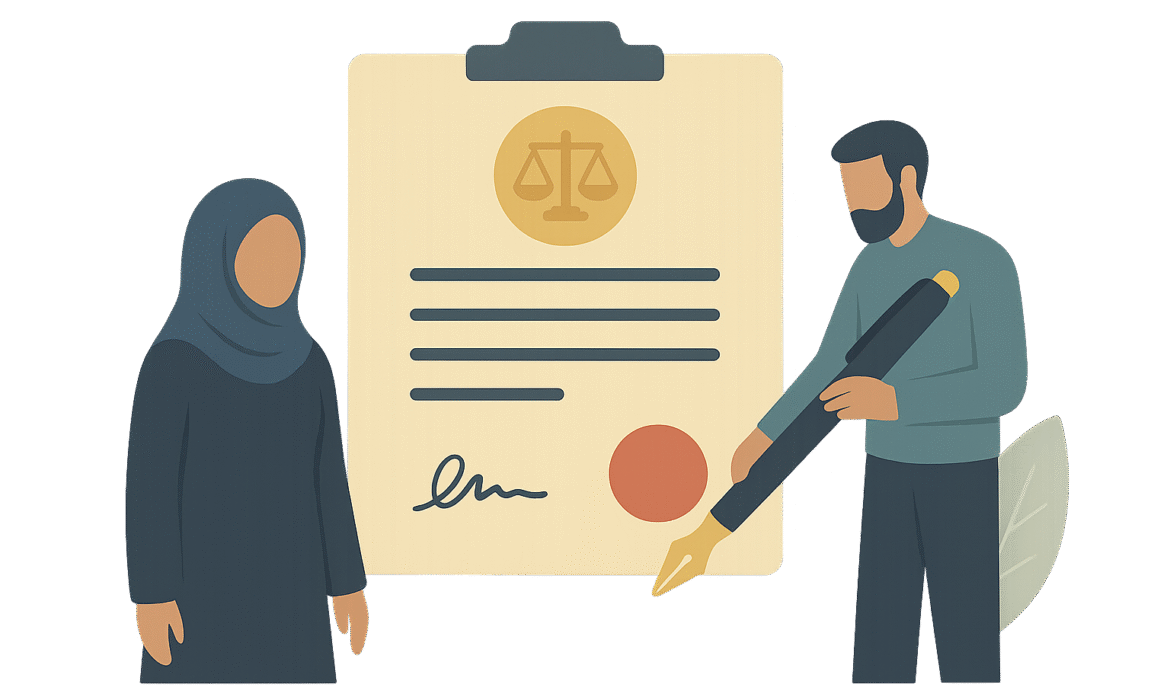Understanding the Importance of Wasiyyah (Bequest)
- Go Lawyers
Wasiyyah (Bequest) Explained
A wasiyyah (bequest) is more than just a way to distribute wealth—it is a deeply rooted Islamic practice that reflects a person’s commitment to their faith, family, and community.
For Muslims, preparing a wasiyyah is a spiritual and ethical duty that ensures assets are distributed fairly and in line with Shariah principles. It allows a person to provide for their loved ones, support charitable causes, and leave a legacy grounded in justice and compassion.
In countries like Australia, creating a valid wasiyyah means aligning Islamic values with local legal requirements. This balance helps ensure your final wishes are honoured both spiritually and legally.
By understanding the purpose and process of drafting a wasiyyah, Muslims can take proactive steps to secure their estate, care for their family, and contribute positively to their community, long after they are gone.
WHAT IS A WASIYYAH?
A wasiyyah is a bequest that allows Muslims to allocate up to one-third of their estate to non-heirs or charitable causes.
WHO CAN BENEFIT FROM A WASIYYAH?
The wasiyyah empowers Muslims to support non-heir relatives, friends, or charitable initiatives while respecting fixed heir shares.
HOW TO STRUCTURE A VALID WASIYYAH
Properly drafting a wasiyyah involves legal clarity, Shariah compliance, and clear documentation to ensure enforceability and harmony.

What Is a Wasiyyah?
A Wasiyyah, or Islamic will, is a directive that outlines how a Muslim’s estate should be distributed after their death. Unlike conventional wills, it is guided by Islamic law, or Shariah, ensuring the distribution of assets aligns with religious principles.
This adherence to religious directives underscores its importance as a moral obligation rather than just a legal necessity.
The primary purpose is to provide clear instructions on asset distribution, ensuring fairness and preventing disputes among family members. By doing so, it upholds the deceased’s wishes and maintains harmony within the family.
Additionally, it serves as a testament to the deceased’s faith, demonstrating their commitment to Islamic values by ensuring their worldly possessions are allocated in a manner that reflects their beliefs.
Religious Significance
In Islam, drafting a wasiyyah is considered a virtuous act. It is recommended for Muslims to prepare a will if they have assets to distribute. The Prophet Muhammad (peace be upon him) emphasized the importance of not leaving such matters unresolved, stating that it is not proper for a Muslim who has something to bequeath to let two nights pass without writing a will. This highlights the proactive approach Islam encourages when it comes to managing one's affairs, emphasizing accountability and foresight. The religious significance of this practice extends beyond personal responsibility; it is seen as an act of worship. By fulfilling this duty, Muslims align themselves with the teachings of the Prophet and the Quran, gaining spiritual merit. Furthermore, it acts as a final opportunity for the deceased to engage in charitable acts, reinforcing the Islamic principle of continuous charity (sadaqah jariyah) which benefits both the giver and the recipients.
- let’s navigate your path forward together.
Including a Wasiyyah in Your Will? We’ll Help You Get It Right.
Get expert advice on structuring your wasiyyah from Australian lawyers. Maximise your impact while staying Shariah-compliant.
Key Components of a Wasiyyah
Distribution of Assets
A wasiyyah allows a Muslim to allocate up to one-third of their estate to non-heirs or charitable causes. The remaining two-thirds must be distributed according to Islamic inheritance laws, which clearly define the shares of spouses, children, and other relatives. This division ensures that the family’s needs are prioritised while also providing for the community and fulfilling the deceased’s charitable intentions.
The structure of asset distribution is designed to prevent favouritism and ensure that each family member receives their rightful share. This equitable distribution is rooted in Quranic injunctions that prescribe specific shares to heirs, reflecting the comprehensive nature of Islamic law in addressing familial rights and responsibilities. By adhering to these guidelines, the Muslim will reinforces the principles of justice and equity in financial matters.
Guardianship
For parents, a wasiyyah can designate guardians for minor children, ensuring their welfare and upbringing according to Islamic values. This is an essential consideration for young families to plan for unforeseen circumstances. Appointing a guardian provides peace of mind, knowing that children will be cared for by someone who shares the family’s values and beliefs.
The designation of guardianship is not only a practical measure but also a spiritual one, as it reflects the parents’ trust in the guardian to uphold Islamic teachings in the upbringing of their children. This aspect underscores the interconnectedness of family responsibilities and religious duties, emphasising the importance of holistic care for the next generation.
Debts and Obligations
A wasiyyah also addresses the settlement of any outstanding debts or financial obligations. Islam places great emphasis on fulfilling debts, and this ensures those responsibilities are met before distributing the estate. This prioritisation reflects the ethical standards upheld in Islam, where financial integrity is paramount.
By including debts and obligations in the will, the deceased ensures that their financial legacy is one of honour and integrity. This highlights the importance of accountability in financial matters, reinforcing the Islamic principle that fulfilling one’s obligations is a prerequisite for spiritual contentment and societal respect.
Creating an Islamic Will in Australia
Legal Considerations
In Australia, Muslims can create Islamic wills that comply with both Shariah and local laws. It is crucial to ensure the will is legally binding under Australian law while adhering to Islamic principles. This often involves consulting both legal and religious experts who can navigate the complexities of integrating these two systems seamlessly.
The dual compliance required for a Muslim will in Australia underscores the need for meticulous planning and expert guidance. By ensuring that both legal frameworks are respected, Muslims can create a Wasiyyah that is both religiously and legally sound, providing clarity and assurance to beneficiaries while honoring the deceased’s faith.
Steps to Drafting a Wasiyyah
- Identify Assets and Liabilities: Begin by listing all assets, including property, bank accounts, and investments, as well as any debts. This comprehensive inventory forms the foundation of the Wasiyyah, ensuring all aspects of the estate are accounted for.
- Determine Beneficiaries: Clearly define who will receive what portion of your estate. Remember to allocate no more than one-third to non-heirs. This step requires careful consideration of family dynamics and personal wishes, balancing emotional ties with religious obligations.
- Consult Legal and Religious Experts: Seek guidance from professionals who understand both Islamic and Australian law to ensure your will is valid. Their expertise is invaluable in navigating the complexities of drafting a Wasiyyah that satisfies all necessary criteria.
- Draft the Will: Create the document detailing your wishes. Ensure it is clear and unambiguous to prevent disputes. Precision in language is crucial to avoid misinterpretations that could lead to conflicts among beneficiaries.
- Witness and Sign: Have the will signed in the presence of witnesses as required by Australian law to make it legally binding. This step formalizes the Wasiyyah, ensuring its enforceability and providing a safeguard against future disputes.
Common Challenges
One challenge is balancing the requirements of Shariah with Australian legal standards. It’s essential to ensure that the will does not contradict Australian laws, which could render it invalid. This balancing act requires a deep understanding of both legal systems and the ability to integrate them effectively.
Additionally, cultural differences and varying interpretations of Islamic law can complicate the drafting process. Addressing these challenges requires open communication and collaboration between all parties involved, ensuring that the Wasiyyah is a true reflection of the deceased’s wishes and values.
The Role of Wasiyyah in Community and Family
Preserving Family Harmony
A well-prepared Wasiyyah helps avoid family disputes by clearly outlining the deceased’s wishes. It ensures everyone understands their rights and responsibilities, which is especially important in multicultural societies like Australia. By providing clarity and direction, a Wasiyyah fosters peace and unity among family members.
Moreover, the process of drafting a Wasiyyah can serve as an opportunity for families to engage in meaningful discussions about values, expectations, and future plans. These conversations can strengthen familial bonds and reinforce the collective commitment to uphold the deceased’s legacy.
Supporting Charitable Causes
By allocating a portion of the estate to charity, a Wasiyyah can support various causes, contributing to the community and helping those in need. This aligns with the Islamic value of charity (sadaqah) and can be a lasting legacy. Through charitable bequests, a Wasiyyah extends the deceased’s impact, creating a ripple effect of positive change.
Charitable allocations in a Wasiyyah reflect the broader Islamic ethos of social responsibility and compassion. By prioritizing charitable giving, a Wasiyyah not only benefits the immediate beneficiaries but also contributes to the well-being of the wider community, embodying the spirit of selfless giving.
Conclusion
Understanding the importance of a Wasiyyah is essential for Muslims wishing to fulfill their religious duties while ensuring their assets are distributed according to their wishes. By creating an Islamic will that complies with both Shariah and local laws, Muslims in Australia can ensure their legacy is preserved, their family is cared for, and their community benefits from their generosity. A Wasiyyah embodies the convergence of faith and practicality, ensuring that one’s final acts are a testament to their beliefs.
Drafting a Wasiyyah is not just about distributing wealth; it’s about leaving a legacy that reflects one’s values and beliefs. It is a powerful tool that provides peace of mind, knowing that one’s affairs are in order and aligned with both faith and legal obligations. Ultimately, a Wasiyyah is a manifestation of a Muslim’s commitment to their faith, family, and community, serving as a lasting reminder of their dedication to justice, charity, and integrity.
- We’re Here to Help — Wherever You Are in NSW
Our Office Locations
Businesses can visit us at any of our convenient Sydney locations, including our main office in Parramatta and several key hubs across the city. Whether you're in the CBD, Norwest, Macquarie Park, or Barangaroo, Go Lawyers is always close by to support your legal needs.
- Level 14, Suite 2, 3 Parramatta Square, Parramatta NSW - 2150
- +61 (02) 8896 6141
- info@golawyers.au
- Level 35, Tower 1 Barangaroo International Towers Sydney, 100 Barangaroo Ave, Barangaroo NSW 2000
- Level 5 Nexus Norwest, 4 Columbia Ct, Norwest NSW 2153, Australia
- Avaya House, level 9/123 Epping Rd, Macquarie Park NSW 2113, Australia
- Chifley Tower, Level 17/2 Chifley Square, Sydney NSW 2000, Australia
At Go Lawyers, we deliver proactive, clear legal guidance across NSW. Contact us today to schedule a consultation at any of our offices.
- Why Choose Go Lawyers?
Professional Lawyers who offer a fixed, fair price
Whether you are an individual, a business owner, or part of a giant corporation, our experienced team delivers solutions that protect your interests and drive results. From drafting contracts and negotiating agreements to resolving disputes through mediation or litigation, we handle every aspect of your legal needs professionally and carefully.
We understand the importance of clear communication and cost-effective services, so we prioritise transparency and efficiency. Our team possesses expertise in risk management, compliance, and the resolution of commercial disputes, allowing you to depend on us as a reliable partner throughout the entire process.
